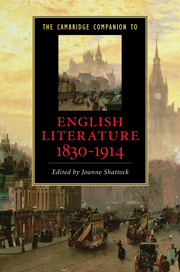Book contents
- Frontmatter
- Introduction
- Part 1 Modes of writing and their contexts
- 1 Authors and authorship
- 2 Readers and readerships
- 3 Life writing
- 4 The culture of criticism
- 5 Women’s voices and public debate
- 6 Writing the past
- 7 Radical writing
- 8 Popular culture
- Part II Intersections and incursions
- Part III The centre and the periphery
- Guide to further reading
- Index
5 - Women’s voices and public debate
from Part 1 - Modes of writing and their contexts
Published online by Cambridge University Press: 28 November 2010
- Frontmatter
- Introduction
- Part 1 Modes of writing and their contexts
- 1 Authors and authorship
- 2 Readers and readerships
- 3 Life writing
- 4 The culture of criticism
- 5 Women’s voices and public debate
- 6 Writing the past
- 7 Radical writing
- 8 Popular culture
- Part II Intersections and incursions
- Part III The centre and the periphery
- Guide to further reading
- Index
Summary
Journalism will, no doubt, occupy the first or one of the first places in any future literary history of the present times, for it is the most characteristic of all [our] productions.
'Journalism', Cornhill Magazine, 1862Since the 1970s, the recuperation of women’s voices has made the work of novelists and poets of tremendous power and accomplishment available for scholarly and teaching purposes. New editions and collections of women’s writing, scholarly monographs and essays, academic journals and professional associations devoted to women’s writing, biographies of key figures - the extraordinary outpouring of such resources since the 1970s has ensured that nineteenth-century women’s writing is securely part of this period’s writing canon. Women’s writing in the periodical and newspaper press, however, has not yet undergone so comprehensive a reclamation as the preferred genres of novels, poetry and life writing, despite scholarship that argues persuasively that the periodical was 'the most significant organ for disseminating knowledge, information, and social attitudes'; despite the long-standing centrality of such figures as Matthew Arnold, Thomas Carlyle and John Ruskin, whose writings first appeared primarily in the periodical press, to our sense of this period; and despite long-standing interest in what the Victorians called 'the Woman Question', a periodical debate of great vigour and range. In this context, the Cornhill Magazine’s certainty about the place of journalism in English literary history is arresting, striking the twenty-first-century reader as somehow misplaced, a quaint reminder about the vast differences in critical sensibilities between then and now.
- Type
- Chapter
- Information
- The Cambridge Companion to English Literature, 1830–1914 , pp. 91 - 107Publisher: Cambridge University PressPrint publication year: 2010



